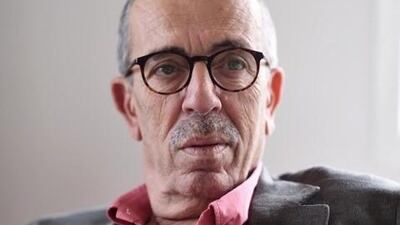The shortlist for the 2020 International Prize for Arabic Fiction (IPAF) has been announced.
The list features six works by authors hailing from Algeria, Egypt, Iraq, Lebanon and Syria.
Unlike last year, where a record number of four women were nominated (with Lebaneseauthor Hoda Barakat going on to become the first female to win the prize outright), this year's list is dominated by men, with only one female novelist in contention.
The prize winner will be announced in the UAE a glittering ceremony in the capital on the eve of the Abu Dhabi International Book Fair on Tuesday, April 14.
Each shortlisted author will collect $10,000 (Dh36,725) and the winner will receive an additional prize of $50,000 – one of the highest prizes in fiction – and the translation of their book into English.
Who are the authors on the shortlist?
When it comes to the names competing for the award, the shortlist throws up a mixed bag of seasoned authors and promising new talent. Two of the authors are no stranger to the awards: former winner, Egyptian author Youssef Ziedan – whose work Azazeel picked up the award in 2009 – is in the running again for his book Fardeqan – The Detention of the Great Sheikh. Set over a century ago, the novel is an engrossing look at the life of Avicenna, the Muslim polymath whose work made a major impact in the study of philosophy.
He is joined by the sentimental favourite, Jabbour Douaihy. The Lebanese author was shortlisted for the IPAF in 2008 (June Rain) and 2012 (The Vagrant), and longlisted in 2015 for The American Quarter. This time around, he is in the running for his novel The King of India, which recounts a murder case in a Lebanese society enflamed with sectarian tension.
They are joined by Algerian author Abdelouahab Aissaoui, who is viewed as an important new voice in the region. His first novel, 2013's Jacob's Cinema, won Algeria's President of the Republic Prize. His talent was further nurtured after he was invited to take part in the IPAF's Nadwa writing workshop in Jordan in 2016. His shortlisted novel, The Spartan Court, is a multi-layered tale of five characters and their varied experiences of colonialism in 19th century Algiers.
Also on the shortlist is Khalil Alrez, the Syrian novelist and Russian literary specialist (he translated celebrated Russian works by Anton Chekov and Evgeny Schwartz). He is shortlisted for The Russian Quarter, an allegorical novel about a neighbourhood being dragged into war.
With the Firewood of Sarajevo, Said Khatibi is shortlisted for a novel that follows the lives of fellow Algerian Salim and Bosnian Ivana. Through their complicated relationship, Khatibi tells the tale of two countries rebuilding from the outbreak of war.
Lastly, the lone female author up for the award is Iraqi writer Alia Mamdouh. Her book, The Tank, explores how location and memories take on extra resonance when a life is spent mostly in exile.
Who are this year’s judging panel?
With the announcement of the IPAF shortlist, comes the full reveal of this year’s judging panel. Chaired by Iraqi literary critic Muhsin Al Musawi, the body includes Lebanese critic and journalist Pierre Abi Saab, Egyptian broadcaster Reem Magued, Algerian novelist Amin Zaoui and Russian academic and Arabist Viktoria Zarytovskaya.
Why the IPAF is going from strength to strength
The news of the IPAF nominees comes on the back on what has been a strong few years for the award. Several novels recognised by the prize received English translations. They were the 2017 shortlisted The Old Woman and the River by Kuwaiti author Fahd Ismaeil, the 2016 shortlisted Guard of the Dead by Lebanon's George Yaraq and 2014's longlisted Clouds over Alexandria by Egyptian writer Ibrahim Abdelmeguid.
The next work set to receive an English translation is last year's IPAF winner The Night Mail by Hoda Barakat. The Lebanese author will discuss the work ahead of its English release in September at both the Emirates Airline Festival of Literature in Dubai on Thursday, February 6 and Hay Festival Abu Dhabi on Tuesday, February 25.
For more information on the IPAF award visit www.arabicfiction.org


